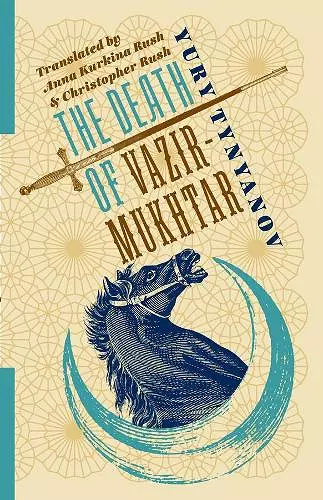The Death of Vazir-Mukhtar
Yury Tynyanov author Christopher Rush translator Anna Kurkina Rush translator
Format:Paperback
Publisher:Columbia University Press
Published:4th May '21
Should be back in stock very soon

The Death of Vazir-Mukhtar, a novel by Yury Tynyanov, one of the leading figures of the Russian formalist school, describes the final year in the life of Alexander Griboedov, the author of the comedy Woe from Wit. As ambassador to Persia, Griboedov was murdered in 1829 by a Tehrani mob during the sacking of the Russian embassy.
One of the central texts of Russian formalist literary production, the novel is a brilliant meditation on the nature of historical and poetic consciousness and of artistic creation. It is a complex and fascinating work that explores the relationships among individual memory, historical fact, and the literary imagination. The result is a hybrid text, containing elements of various genres—historical, biographical, existential, and adventure novels—and a deeply personal, almost confessional testament to the writer’s relationship to his generation and the state. Completed in 1927, almost a century after the events it depicts, The Death of Vazir-Mukhtar marks the watershed between revolution and reaction. At a time when the Soviet regime was becoming increasingly restrictive of freedom of expression and conscience, Tynyanov grappled with the themes of disillusionment, betrayal, and unrealized potential. Unabashedly intellectual yet filled with intrigue and suspense, The Death of Vazir-Mukhtar is a great historical novel of Russian modernism.
[G]ripping and gratifying, if not quite easy, reading. The translators wrestle skilfully with an unruly original, and we are lucky to have ringside seats. -- Boris Dralyuk * Times Literary Supplement *
The Death of Vazir-Mukhtar is grand novel rooted in the old Russian tradition -- but also in much of the new, a work that is also experimental, a work of the 1920s Soviet Union when Russia was in similar ferment and people faced similar crossroads. Tynyanov's modernism is far removed from the writing of Tolstoy and Dostoevsky, yet achieves similar sweep and detail; grounded in the historical, it nevertheless avoids being dryly documentary. -- M.A. Orthofer * Complete Review *
[This] crisp new English translation of this dazzling and erudite novel by Anna Kurkina Rush and Christopher Rush . . . underscores Tynyanov’s signal achievement . . . Readers with an interest in Russian history and literature, or a more general interest in how the Great Game was played in the 19th century, will likely find The Death of Vazir-Mukhtar riveting. -- Richard Byrne * The Wilson Quarterly *
Using meticulous research to fuel his imagination, [Tynyanov] endowed his characters with emotional lives rarely found in archives. The Death of Vazir-Mukhtar, first published in 1928, is a fine specimen of this technique . . . The text is full of fragmentary hints, deftly preserved in all their ambiguity by the translators, Anna Kurkina Rush and Christopher Rush, who leave the reader to decode the author’s messages. -- Anna Aslanyan * Los Angeles Review of Books *
Another fine rendition...with a splendid introduction by Angela Brintlinger and helpful supplementary material identifying people and allusions unfamiliar to the nonspecialist. A brilliant thinker and a splendid writer, Tynyanov deserves to be better known. -- Gary Saul Morson * New York Review of Books *
The well-known formalist literary scholar Yury Tynyanov was a master of form. In bracing prose style, his novel The Death of Vazir-Mukhtar dives deeply into the life of the Russian poet Alexander Griboedov and Russian cultural and political history. This translation by Anna Kurkina Rush and Christopher Rush brings the reader every unexpected turn of Griboedov’s life and thoughts. -- Sibelan Forrester, translator of Vladimir Propp’s The Russian Folktale
Together with Shklovsky and Jakobson, Tynyanov was the face of Russian formalism—the premier student of Romanticism. His historical novels draw on the extensive wealth of archival materials he acquired as a critic. Tynyanov’s novel is a must-read! -- Peter Steiner, author of Russian Formalism: A Metapoetics
Tynyanov’s novel transforms the life of writer-diplomat Alexander Griboedov into the death of the author as such, dispersed discursively even as he is dismembered physically, through bureaucratic manipulation, high-society intrigue, diplomatic complicity, and social oblivion. This book recasts the familiar story of the martyred Russian writer, anticipating by a century the fate of Soviet intellectuals whose life and work would be subsumed by the state. -- Harsha Ram, author of The Imperial Sublime: A Russian Poetics of Empire
The novel’s omniscient narrator tracks and probes dozens of characters, but mostly we follow Griboedov—observant, ironic, scheming—as he pursues his fortune. Enriching it all is plenteous period detail . . . And none of it is tedious. In fact, the effect is light, fast, and decidedly cinematic. -- Michael Kasper * Rain Taxi Review of Books *
This is a story of political repression of writers and rebels—of symbolic as well as literal dismemberment—but it is also a sharp-eyed account of the struggle of empires to maximize their economic clout through colonialism, a fascinating
example of an anticolonial Soviet historical novel. -- Sophie Pinkham * New York Review of Books *
- Short-listed for John and Margaret Savage First Book Award - Nonfiction, Nova Scotia Book Awards 2023
ISBN: 9780231193870
Dimensions: unknown
Weight: unknown
632 pages